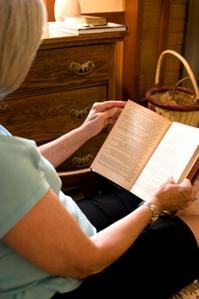My friends, we've got work to do. It's hard to look at what's happening in the world around us and think that as a population we should be reading less.
--Jason Gay, in his recent Wall Street Journal column
 It seems like only yesterday (though it was 2017) that we ran the headline "Gallup: 'Most Americans Are Still Reading Books.' " Back then, Americans were "consuming books at nearly the same rate that they were when Gallup last asked this question in 2002--before smartphones, Facebook or Twitter became ubiquitous. More than one in three (35%) appear to be heavy readers, reading 11 or more books in the past year, while close to half (48%) read between one and 10 and just 16% read none."
It seems like only yesterday (though it was 2017) that we ran the headline "Gallup: 'Most Americans Are Still Reading Books.' " Back then, Americans were "consuming books at nearly the same rate that they were when Gallup last asked this question in 2002--before smartphones, Facebook or Twitter became ubiquitous. More than one in three (35%) appear to be heavy readers, reading 11 or more books in the past year, while close to half (48%) read between one and 10 and just 16% read none."
Ah, but that was yesteryear. Earlier this month, Gallup released new survey results under a less encouraging banner ("Americans Reading Fewer Books Than in Past"), noting that respondents said they had read an average of 12.6 books during the past year, a lower number than Gallup had measured in any prior survey dating back to 1990. U.S. adults were reading two or three fewer books per year than they had between 2001 and 2016.
The stats were based on a poll, conducted December 1-16, that asked 811 adult Americans how many books they'd read, either all or part of the way through, during the past year, including print, e-books and audiobooks.
Gallup noted that the decline was primarily a function of the total number of books read, as opposed to fewer readers. The 17% of people who said they did not read any books in the past year was similar to the 16% to 18% measured in 2002 to 2016 surveys, though higher than in the 1999 to 2001 polls. The overall drop, however, was "fueled by a decline in the percentage of Americans reading more than 10 books in the past year. Currently, 27% report that they read more than 10, down eight percentage points since 2016 and lower than every prior measure by at least four points."
 My favorite sentence from Gallup's press release: "The reasons for the decline in book reading are unclear, with Americans perhaps finding other ways to entertain themselves." Sound familiar? Public concerns about distracting entertainment alternatives to books have historically landed on a convenient list of villains, depending on the era (magazines, movies, radio, TV, personal computers, Internet, gaming, smartphones, social media, etc.).
My favorite sentence from Gallup's press release: "The reasons for the decline in book reading are unclear, with Americans perhaps finding other ways to entertain themselves." Sound familiar? Public concerns about distracting entertainment alternatives to books have historically landed on a convenient list of villains, depending on the era (magazines, movies, radio, TV, personal computers, Internet, gaming, smartphones, social media, etc.).
Curiously, while Gallup found Americans in most major subgroups were reading fewer books, the decline was greater among more avid readers, particularly college graduates, who read an average of about six fewer books in 2021 than they did between 2002 and 2016 (14.6 versus 21.1), as well as women (15.7 versus 19.3) and "older Americans" (12 versus 16.7). Men, on the other hand, kept their already low bar steady (9.5 versus 10.5).
Gallup offered what it called a Bottom Line: "Reading appears to be in decline as a favorite way for Americans to spend their free time. In 2020, a few months into the Covid-19 pandemic, when many Americans were still reluctant to leave their homes, Gallup found 6% of U.S. adults naming reading as their favorite way to spend an evening, down from 12% in 2016."
The pollster contended its new data reinforces the idea that the popularity of reading is waning, adding it "is also uncertain at this point whether the declines in book reading mark a temporary change or a more permanent one."
I have questions, of course. How many books do I read a year? That seems like a simple one, but it leads down the rabbit hole of followups: How many books do I start? How many books do I finish? Should unfinished books still count as having been read? Is there a page limit for Gallup? Does finishing a 120-page poetry or story collection count the same as reading half of an 800-page biography? How do we factor reading picture books into the equation?

- Get a book.
- Accept the fact that the book you will read will not be the book on your bedside table.
- Get yourself a "reading chair."
- Bury your phone.
- Stop reading this. You could be riveted to Melville right now, and instead, you're still staring at this dopey paragraph.
In response to the Gallup poll, the Book Shop of Beverly Farms in Beverly, Mass., tweeted: "So strange. The Gallup numbers say reading is down. Sales numbers say people read more books now than they did in 2004. Maybe we just don't lie to pollsters as much anymore?"
As is often the case with these kinds of surveys, I don't know what to think. It's easy to be cynical or unsettled, but Gallup's 27% (down from 34% in 2016) number for respondents who read 11-plus books doesn't really scare me. Maybe I just have a gambler's hunch, factoring in the uncertainties created by margin for error, random sampling and vague questions. But I'm wagering the numbers will rise again next time Gallup checks in, hopefully not during a pandemic when all bets are off the table.

